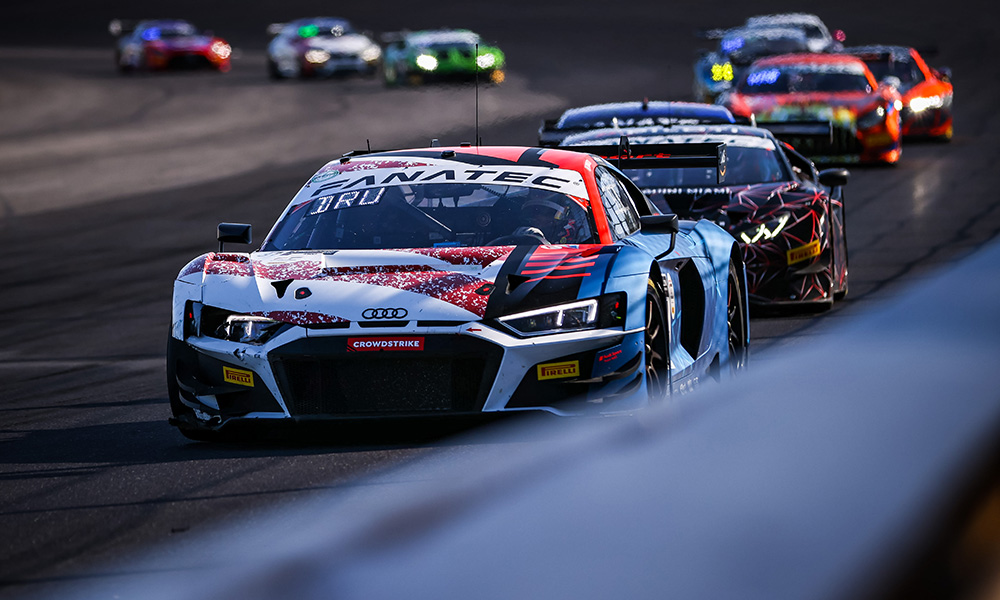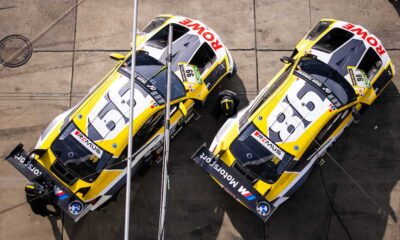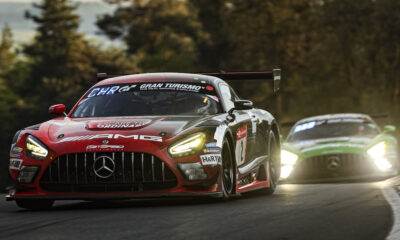
Photo: Fabian Lagunas/SRO
SRO Motorsports Group founder and CEO Stephane Ratel has defended race control and the decisions made during the Indianapolis 8 Hour presented by AWS and said the event was not an “absolute catastrophe” as some people had described it to be.
The second leg of the Intercontinental GT Challenge powered by Pirelli, which also served as the season finale for Fanatec GT World Challenge America powered by AWS, resulted in 11 full course cautions and a number of frustrated drivers and teams post-race for various incidents that occurred.
Some drivers, including Jeroen Bleekemolen and Paul Holton, were vocal post-race as well as Dries Vanthoor, who questioned the penalty given to the No. 32 Team WRT Audi R8 LMS GT3 Evo in the closing stages of the race.
It had come amid other incidents pre and post-race with delays in stewards decisions.
Ratel acknowledged “some mistakes” but told Sportscar365 that he doesn’t believe it impacted the running of the race and the final result.
“It’s correct that everything didn’t go perfectly well,” he said. “We cannot completely disregard that there has been some issues.
“But I would say that most race events, if you walk around the paddock and you look for people to complain, you are always going to look for people to complain.
“If you specifically listen to these ones, you will get the feeling that everything went bad.
“But I don’t think everything went bad, in my opinion.
“I went to see at the end of the race Jacquie Groom, who is my trusted sporting director for 20 years. Speaking to Jacquie, I didn’t have the feeling that the event was an absolute catastrophe. Not at all.
“Yes, there have been some mistakes, but in many, many races – especially long-distance races – mistakes are [made].”
When asked about the level of communication he had with concerned competitors following the event, Ratel said “my phone didn’t ring on Monday.”
He added: “Running on that particular circuit, the combination of incomprehension from some European teams running according to U.S management might have actuated some of the misunderstanding.
“The running of multi-class with important speed differences on that particular circuit… we didn’t push the cars into one another. To run an eight-hour race with [11] safety cars is not easy for anybody. That’s the conclusion.”
Ratel stressed that the nature of IGTC — in utilizing locally based race controls — had an impact on the event although he said he fully supports the decisions made by the SRO America staff.
“The competitors should be used to run according to Australian rules with an Australian ruling [for Bathurst 12H] with a complete Japanese event when they are in Suzuka,” he explained. “When they come to America, they should also be ready to run according to the way American races are being run.
“I think they have integrated it well because we didn’t have this kind of problem when they are in Australia or Japan, but when they came to America…
“Jacquie said it was a mistake that [she] came, because when they see Jacquie and Abi with the SRO shirts and SRO everywhere, some of the European teams believe they were running in GT World Challenge Europe.
“Even if we have made an effort to put the regulations closer together – but even if the rule is written in a certain way – the application of the rule in American racing is slightly different.
“The closing of the pit lane that creates a commotion; the warning that was given to Dries Vanthoor. All of this was really… they saw it from a European standpoint and not entirely in the way an American running of the event is going.
“That, I think, created some incomprehensions between some teams and the race direction.
“But then again… maybe in the future Jacquie and Abi will stay at home and the teams will arrive at a U.S event and will have to expect that it is un as a U.S event with U.S officials.”
Ratel added: “I defend our officials. I don’t think they are inefficient: they just run it in the way they run other events. There was certainly some incomprehension about the management of it.
“If you mention what happened to the Black Swan car… In the briefing I think they said they would avoid wave-bys and then some teams came to complain.
“They issued a bulletin [on Saturday] to clarify that. And I think it should be the work of the team manager to read the bulletins and to be informed about that.
“So when after the drivers slammed the door and said that things weren’t done according to the rules when everyone has received a bulletin especially for that, I think it’s not the fault of the organization.”
Regarding the late-race penalty the No. 32 WRT Audi for ‘disobeying instructions from the race director,’ Ratel said: “Maybe WRT didn’t fully understand it. I don’t know how it… when [Christopher] Mies banged into one car at the entrance of the pit lane, that wasn’t sanctioned.
“I don’t know if it’s one of the reasons – but it put a little yellow card [on the car]. And when there was then another something that didn’t go, he got the full invoice.
“It’s difficult. I’m never in race control and it’s not my [domain]. But I don’t think the stewards just decided this penalty out of their heart, saying ‘ha ha, let’s have fun and penalize car No. 32’.
“Especially the Americans: they look by car number and don’t know what is at stake. They just do their job.”
SRO Sticking With Indy; Proposes GT3-Only Race in 2022
Ratel said this year’s race, which featured a 39-car starting field including 14 GT4 cars, showed that the race should become GT3-only in 2022.
“It’s certain that we realized that the mix of GT3 cars and GT4 cars on this specific circuit is maybe not ideal,” he said. “We didn’t create the [11] safety cars; we were not the GT3 drivers running into each other and the GT4 cars.
“We believe that from 2022, instead of moving to another circuit, we prefer to build on what we started at Indianapolis to keep the Indy 8 Hour but make it full GT3-only.
“Simply because we think the grid is mature enough. This year we had 28-29 [GT3] cars. We believe next year, that is travel resumes normally, we should have more Europeans and [GT3] manufacturers.
“We believe we can grow [to] maybe 32-34 cars. If we have 32-24 cars on an eight-hour event, it’s absolutely OK and sufficient.”
Ratel said they plan to incorporate the entire eight-hour race length into the GTWC America portion of the race as well, to eliminate further complications.
“Almost all the competitors [ran] for the full distance [this year],” Ratel said. “We are going to put the eight-hours as part of both championships – exactly like Spa – it’s part of the GTWC Europe and Intercontinental. The same will apply in America.
“The Indy 8 Hour will become part of the GT World Challenge America and Intercontinental. Those are the changes that we want to propose for next year.”

























